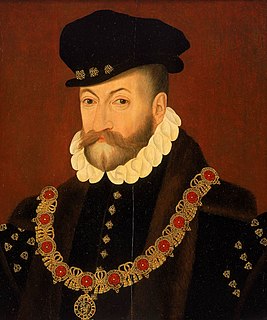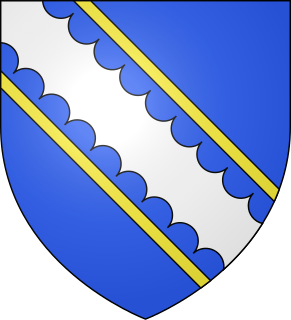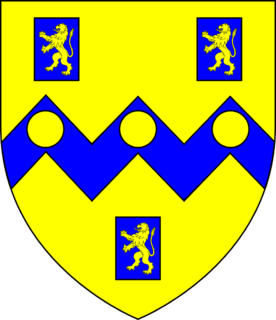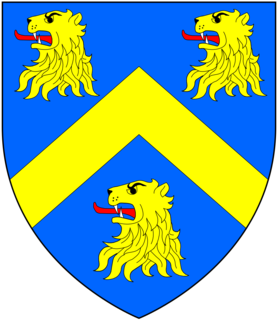Duke of Newcastle upon Tyne is a title that has been created three times. The related title Duke of Newcastle-under-Lyne (sic) has been created once to provide a slightly more remote special remainder. The title first was conferred in 1665 when William Cavendish was made Duke of Newcastle upon Tyne. He was a prominent Royalist commander in the Civil War. He had already been elevated as Viscount Mansfield in 1620, Baron Cavendish of Bolsover and Earl of Newcastle upon Tyne in 1621 and Marquess of the latter in 1643, and was created Earl of Ogle as main subsidiary title to the dukedom to be used as a courtesy style for his heir presumptive.

Baron Clinton is a title in the Peerage of England. Created in 1298 for John de Clinton, it is the seventh-oldest barony in England.
Earl Fortescue is a title in the Peerage of Great Britain that was created in 1789 for Hugh Fortescue, 3rd Baron Fortescue (1753–1841), a Member of Parliament for Beaumaris and Lord-Lieutenant of Devon.

Earl of Chichester is a title that has been created three times in British history. The current title was created in 1801 for Thomas Pelham, 2nd Baron Pelham of Stanmer in the Peerage of the United Kingdom.

Baron Walpole, of Walpole in the County of Norfolk, is a title in the Peerage of Great Britain.
Baron Newborough is a title that has been created twice in the Peerage of Ireland. Both titles are extant. The first creation came in 1716 in favour of George Cholmondeley, later 2nd Earl of Cholmondeley. See Marquess of Cholmondeley for further history of this creation. The second creation came in 1776 in favour of Sir Thomas Wynn, 3rd Baronet. He represented Caernarvonshire, St Ives and Beaumaris in the House of Commons and also served as Lord Lieutenant of Caernarvonshire. His eldest son, the second Baron, represented Caernarvonshire in Parliament. He died unmarried and was succeeded by his younger brother, the third Baron. He served as High Sheriff of Anglesey in 1847. On his death the titles passed to his grandson, the fourth Baron. He died as a result of an illness contracted on active service during the First World War and was succeeded by his younger brother, the fifth Baron. When he died in 1957 the titles were inherited by his first cousin, the sixth Baron. He was the son of the Hon. Charles Henry Wynn, third son of the third Baron. As of 2017 the titles are held by the sixth Baron's grandson, the eighth Baron, who succeeded his father in 1998.
Elizabeth Blount, commonly known during her lifetime as Bessie Blount, was a mistress of Henry VIII of England.

Edward Fiennes de Clinton, 1st Earl of Lincoln, KG was an English nobleman and Lord High Admiral. He rendered valuable service to four of the Tudor monarchs.
John St Aubyn may refer to:
Gentleman of the Bedchamber was a title in the royal household of the Kingdom of England from the 11th century, later used also in the Kingdom of Great Britain.
Charles Wyndham or Windham may refer to:

Hugh Fortescue of Filleigh and Weare Giffard Hall in Devon and of Ebrington Manor in Gloucestershire, was a British landowner and Whig politician who sat in the English and British House of Commons between 1689 and 1713.

Robert Rolle was an English politician who sat in the House of Commons at various times between 1654 and 1660.

The Wyndham family are descended from Sir John Wyndham (1443–1503) and his wife Margaret (1443–1524) daughter of John Howard, Duke of Norfolk. Succeeding generations have played an important role in English politics, the law, the military and the arts.

Margaret Rolle, 15th Baroness Clintonsuo jure, was a wealthy aristocratic Devonshire heiress, known both for eccentricity and her extramarital affairs.
Theophilus Clinton, 4th Earl of Lincoln, KB, styled Lord Clinton until 1619, was an opponent of Charles I during and preceding the English Civil War.
This page is based on this
Wikipedia article Text is available under the
CC BY-SA 4.0 license; additional terms may apply.
Images, videos and audio are available under their respective licenses.







